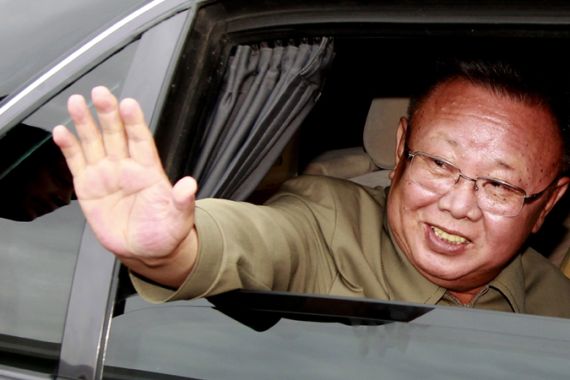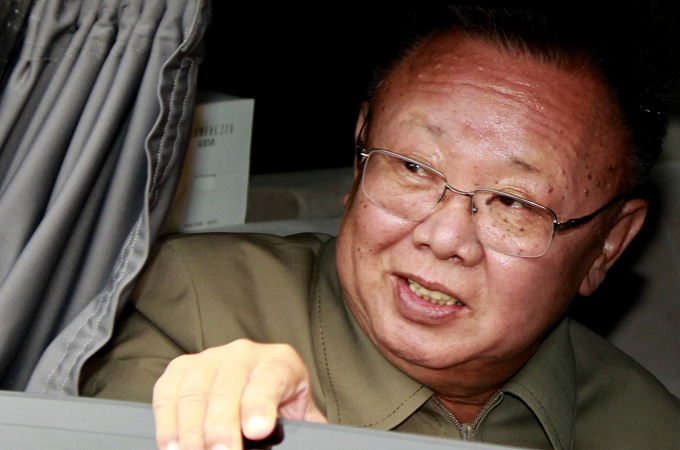Kim Jong-Il’s nukes are good for nothing
The North Korean regime won’t be protected by its nuclear arsenal.

 |
| Few countries besides Russia and China have had a relationship with Kim Jong-Il’s North Korea in recent years [EPA] |
This article was originally published on Al Jazeera on November 13, 2011.
Since the international intervention in Libya, and the subsequent execution of Gaddafi, one particularly nefarious claim that has emerged is to assume North Korea’s Kim Jong-Il will be further deterred from disarming his nuclear arsenal.
Arguably the strongest case for Kim Jong-Il to “never disarm” was put forward by one of the most central figures in international security theory: the US neorealist scholar, Kenneth Waltz.
Writing with a Columbia University postgrad, Mira Rapp-Hooper, for the Atlantic, Waltz reasons that, “a dictator who wants to hold on to power should also hold onto his nuclear weapons”.
Such neorealist deterrence logic, which gained unrivalled currency during the Cold War, is based on Waltz’s assertion that:
|
“The likelihood of war decreases as deterrent and defensive capabilities increase. Nuclear weapons, responsibly used, make wars hard to start. Nations that have nuclear weapons have strong incentives to use them responsibly. These statements hold for small as for big nuclear powers. Because they do, the measured spread of nuclear weapons is more to be welcomed than feared”. |
Despite the increasing number of theorists and practitioners arguing that such “material” factors are not the sole, nor even the primary drivers of state behaviour, as recently as 2003, Waltz stated more plainly that, “any fool can see that the only way you can deter the United States is with weapons of mass destruction”.
I have two reasons to risk being deemed a “fool”.
Firstly, nuclear deterrence is primarily useful in theorising state security – not that of regimes, and even less so of individuals. As such, Waltz and Rapp-Hooper’s argument is, at best, internally contradictory.
For instance, the authors cite the removal of leaders of states that were alleged, or widely suspected, of possessing nuclear and other WMD capabilities as evidence of the need to hold WMD for regime survival. As in:
|
“The last two decades have provided him with numerous cautionary tales of dictatorships defeated – the Iraqi army was trounced in 1991, NATO triumphed over Milosevic in 1999, and the US invaded Iraq in 2003”. |
However, the popular discourse in 2003 – and justifiably so in 1991 – was that Iraq had extensive WMD capability, and the mindset to use them. At the time, Waltz is known to have made the point that the 2003 invasion was not about “pre-emption”, because there was no evidence Saddam was about to use his alleged WMD, it was rather a measure of “prevention” so that he could not use them in the future. In 1991 and 2003, then, Waltz was of the belief that Saddam indeed possessed WMD, but he still advocated both actions against Saddam, which somewhat contradicts his assertions that nuclear weapons deter.
More importantly still, the belief that Saddam possessed WMD immediately prior to the invasion was also strongly held by the Bush administration, as well as by the governments of the United Kingdom and Australia.
How strong, then, is the claim – and much less so Waltz and Rapp-Hooper’s evidence – that Kim Jong-Il’s nuclear weapons are necessary to deter would-be aggressors?
Second, the case for comparison between Gaddafi’s Libya and Kim Jong-Il’s North Korea is weak; Gaddafi is known to have surrendered his nuclear weapons ambitions in 2003 in order to resume political and economic relations with the US and its Western allies, and was – at that time – some way off acquiring an operational arsenal. Kim Jong-Il has held similar talks since the mid-1990s, including issuing a joint statement with South Korea and the US in 2005, committing to total disarmament of North Korea’s existing nuclear arsenal.
In addition, the execution of Gaddafi was triggered and brutally exercised by an intra-state force, against which Gaddafi had little capacity to use nuclear weapons – let alone any other WMD. Indeed, it was the use of conventional weapons against Libya’s citizenry in the North that directly led to an historic evoking of the “responsibility to protect” by the international community. Interestingly, too, though Gaddafi had no operational nuclear weapons, he appeared to choose not to use those chemical weapons that were at his disposal.
While the possession of operational nuclear weapons may have deterred NATO forces from entering the conflict, there is nothing to say alternate support in the form of arming the rebels, would not have led to the same outcome.
And finally, however purely rhetorical Kim Jong-Il’s commitment might be, his regime is arguably at the point where it must seriously consider its long-term viability under conditions of continued economic and political isolation. That said, volatile and aggressive relations with the US and the West have long punctuated Kim’s reign, and friendly relations are ideologically intractable for the foreseeable future.
Therefore, bargaining – the sine qua non of deterrence – is out of the question.
‘Chicken’ as strategy
Most simply conceived, Kim’s diplomatic strategy has largely resembled the game of “chicken” – a type of coordination game modelled on the driving contest often seen in pop films in which two cars careen towards each other; the first driver to swerve is the loser, and if neither driver swerves, both are losers.
Now imagine playing this game and seeing from afar that the other driver has removed his steering wheel and has thrown it out of the window! Knowing your rival can no longer steer, an accident is assured unless you veer aside. Paradoxically, for your rival, being out of control means being in control.
In the same way, under Kim’s leadership, North Korea has eschewed all economic and diplomatic incentives to cooperate with the West – to make clear its intentions to veer to the side of the road in times of potential conflict. Instead, Kim has actively pursued a policy that puts him out of control – he has created the impression that he is without the capacity to change course.
The lesson one may take from the game of chicken is this: Cooperation can occur between antagonists when either both parties have reputations of being cooperative, or when only one of the actors is known to be completely out of control (which North Korea, relative to its peers, is).
North Korea’s nuclear weapons are not all that effective at achieving either strategy – they make it difficult to ever cooperate, and they are difficult to possess in a manner that enables out of control behaviour. That is, nuclear deterrence stabilises state behaviour, which says little for the security of Kim Jong-Il.
Could conventional weapons deter?
Reviewing the critical reaction to Waltz and Rapp-Hooper’s article would seem to indicate that I am – perhaps foolishly – on my own.
Indeed, other commentators, such as Eli Jacobs, have criticised Waltz and Rapp-Hooper’s logic from a strategic perspective. In so doing, Jacobs puts forward a triumvirate of reasons why the “Gaddafi lesson” is not overly relevant for North Korea: Kim Jong-Il has long held nuclear ambitions, as will his successor, conventional forces alone could account for any foreseeable attack on Kim Jong-Il, and Gaddafi’s state and military apparatus was relatively weak.
But this courageous (and, some have argued, overly confident) attempt by Jacobs appears more intent on taking down Waltz than offering a sustainable alternative argument.
Most problematic is Jacobs’ sensational claim that conventional weapons – such as tanks, fighter planes and missiles – would be enough to ensure Kim Jong-Il’s security:
|
“Conventional forces alone can often do the trick. For example, Iran’s geography and North Korea’s massive army would, combined with other non-nuclear factors, likely deter regime change pursued by military means.” |
Jacobs therefore also treats the distinction between regime leadership and state survival as a mere semantic one. As the executions of Gaddafi, Saddam and bin Laden have shown, no matter what, if the US, NATO, United Nations, or “the West” wants a regime or leader removed, it will do so – regardless of the strategic depth or weapons capabilities of the state in question.
In sum, then: nuclear and conventional deterrence works best at the level of states, for in this era of warfare, as the US is brutally demonstrating in Pakistan and elsewhere, not even international law is effective at protecting individuals from harm.
So to return to Waltz and Rapp-Hooper’s provocation: Kim Jong-Il’s nukes are good for nothing, if their intention is to secure Kim Jong-Il’s personal security.
NAJ Taylor is a doctoral candidate in the School of Political Science and International Studies at the University of Queensland, and editor of This Blog Harms.
Follow him on Twitter: @najtaylor.
The views expressed in this article are the author’s own and do not necessarily reflect Al Jazeera’s editorial policy.
